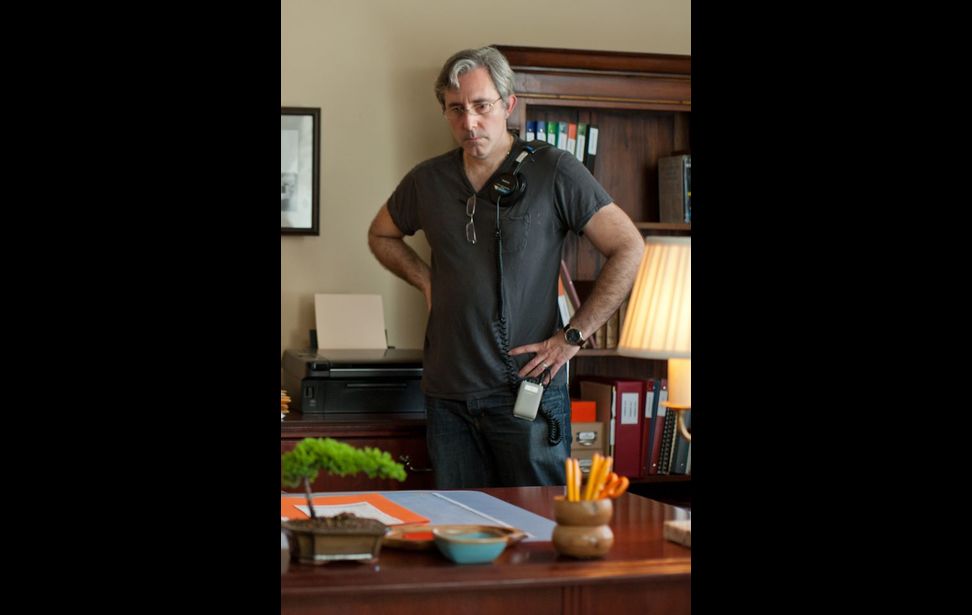On Writing and Directing for Hollywood: A Conversation with Paul Weitz
Paul Weitz is a producer, playwright, screenwriter and film director most notably known for “American Pie” (1999), which he created with his brother Chris. Weitz’s credits include “Little Fockers” (2010), starring Robert De Niro and Ben Stiller, the animated film “Antz” (1998), starring Woody Allen, and the Broadway play “Lonely I’m Not” (2012), starring Topher Grace. "Lonely I'm Not" is the follow-up on the character that Grace plays in Weitz’s film, “In Good Company” (2004). Weitz has been nominated for eight awards, including an Oscar for “About a Boy” (2002, best screenplay). His newest film, “Admission,” starring Tina Fey and Paul Rudd is due out in theaters March 2013.
Weitz took time out of his busy post-production schedule to talk with thalo about his career in Hollywood.
thalo: Your films deal with the human condition in blunt, raw honesty with a comedic spin. You’ve mentioned in past interviews that you are self-aware of your own actions as a human. How does your art reflect/contrast your role as brother, father, husband?
Paul Weitz: (as seen in photo 1) Thanks for saying that—it's certainly something to aspire to. I am interested in learning about humans so I can impersonate one with greater skill. Making films or plays can be a great way of studying. I remember as a kid trying to make models out of clay, and always, always thinking, "Well, that looks just awful." Sometimes I feel like that as a creative artist.
I try to remind myself that art is a part of life, not vice versa. It contrasts with reality because I can usually make the characters do what I want when I'm writing, and I can usually make the crew and the actors do what I want on a set, if I ask politely, but I sure as hell can't get my kids to do what I want on anywhere near a similar basis. Because they are on to me.
I think I'm a pretty good brother.
th: Who did you admire growing up? Who are/were your greatest mentors in the industry?
PW: There were some family friends who I admired as a kid because they were cool. I admired Geoffrey Holder, who was a Trinidadian actor, choreographer, painter and director. He was gigantic, and he had a gigantic ring on his finger and he played Baron Samedi in “Live and Let Die.” You can't get cooler than that. Unless you were Max Von Sydow, another family friend, who was maybe even taller and deeper voiced than Geoffrey. I got to go to the circus with Ingmar Bergman. Unfortunately I was a kid, so I couldn't ask him about the idea he speaks of in Images of "the little world" of theatre and film. I like living in that little world, though.
One mentor was an actor named Larry Pressman, who's my godfather. He illustrated what it is to live unpretentiously for art. And to pay your bills as a working actor.
Jeanine Basinger, a film professor at Wesleyan, is a mentor who I admired not just because her pillow was stuffed with 35 millimeter film, but because she came from an unconventional background. When I tried to make my senior thesis project at Wesleyan I had a breakdown and pulled the plug on myself after two days of shooting… So I went to Jeanine, and she said it is okay to fail sometimes. Which was excellent advice. Pick yourself up and move on.
th: Looking back, how has the fame of “American Pie” affected your career? What was the defining moment that confirmed that you were in the right profession?
PW: The defining moment that confirmed I was in the right profession was when I got a check with my name on it. It took seven more years to have my name on a film. I think a career is like a golem. You kind of built it, but it kind of has a life of its own and you're hoping it doesn't go haywire and kill you.
Honestly, I feel like I'm in the right profession when I am writing and I look at the clock and a few hours have gone by without my noticing it. And I feel like I'm in the right profession when I'm on set as a director and I feel really really alive, alive to everything happening on the set and in the story (as seen in photo 2). The rest of it? Enh.
“American Pie” taught me that every film I directed would be an out of the blue, worldwide phenomenon. Sadly, this lesson was inaccurate. “American Dreamz” taught me that sometimes your best work gets shat on. But what all this stuff teaches me is it doesn't matter. Just make the stuff if you have to—and I do have to—sorry about that.
th: Please discuss your new film, “Admission,” an adaptation of the novel by Jean Hanff Korelitz, and how you got involved.
PW: “Admission” is about a woman who is hiding, and her hiding place gets bulldozed (as seen in photo 3).
Kerry Kohansky, a producer who worked for my company, read it and was trying to figure out who should adapt it. I read it and felt the x-ray of the novel would make an interesting film. Also, shamefully, I hadn't made a film with a female protagonist. How lame is that? I worked on the story with Karen Croner, a talented writer I had known socially for a while. I pitched the story to Tina Fey because I knew if she didn't want to make the same version, it was pointless. She [Fey] was into it, and Karen went off and wrote, and then I circled back with Karen and worked on the script with her.
And then Focus gave me a low budget number at which they would make it, and I called their bluff.
th: What is your next project?
PW: I have a couple of original ideas I am working on, pretty much in the terrain of personal, emotional stories with a web of societal issues around them. And I am adapting the novel Bel Canto, which will be very challenging to do properly. I hope I do a good job with it.
Be sure to check local listings in March 2013 for “Admission.” For the official “Admission” trailer, Click Here. For more information on Paul Weitz and a compete listing of his film and television credits, check out the International Movie Database.
Photos:
Photo 1: Paul Weitz © David Lee
Photo 2: Paul Weitz © David Lee
Photo 3: Admission Movie Poster: Google Images










